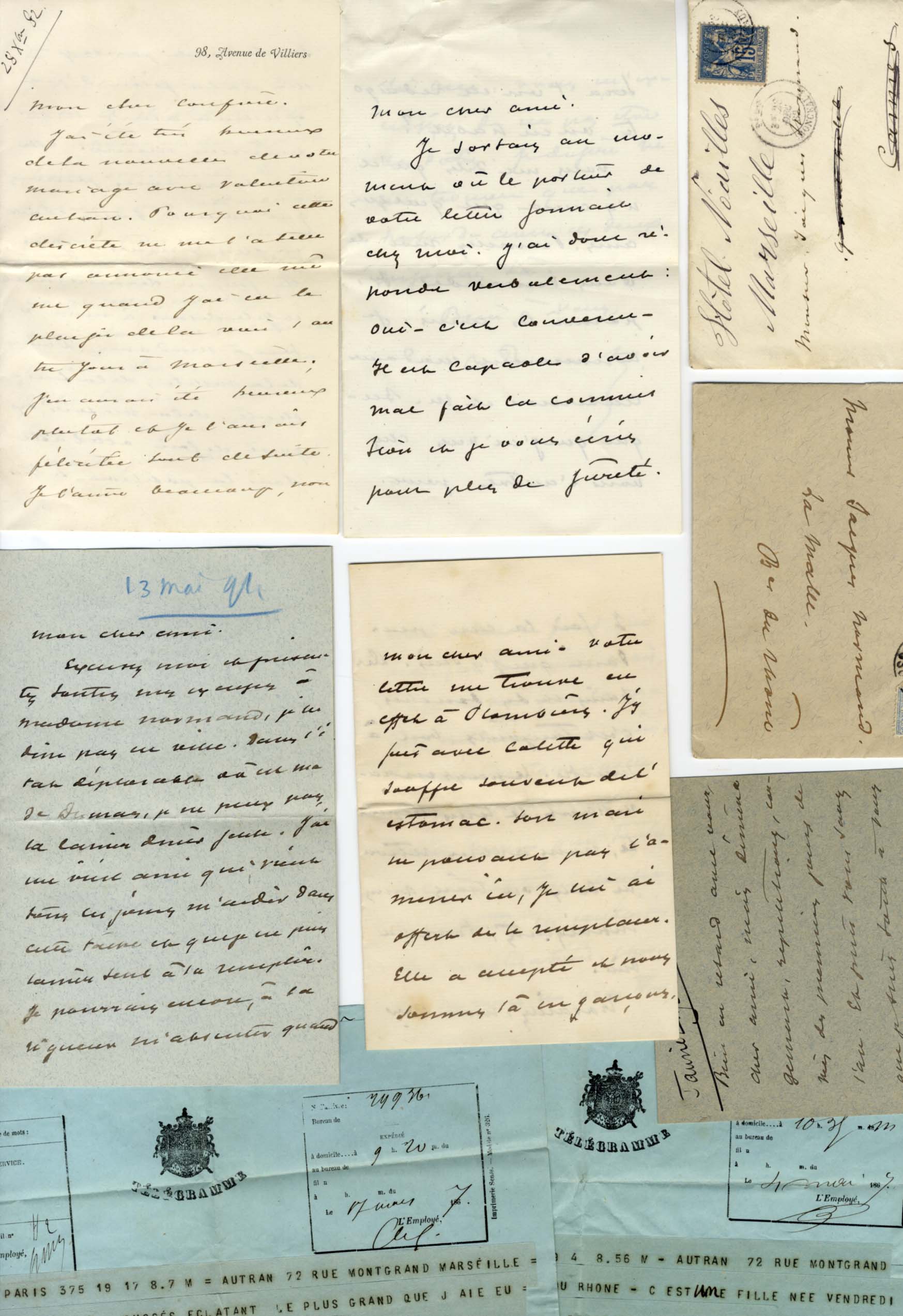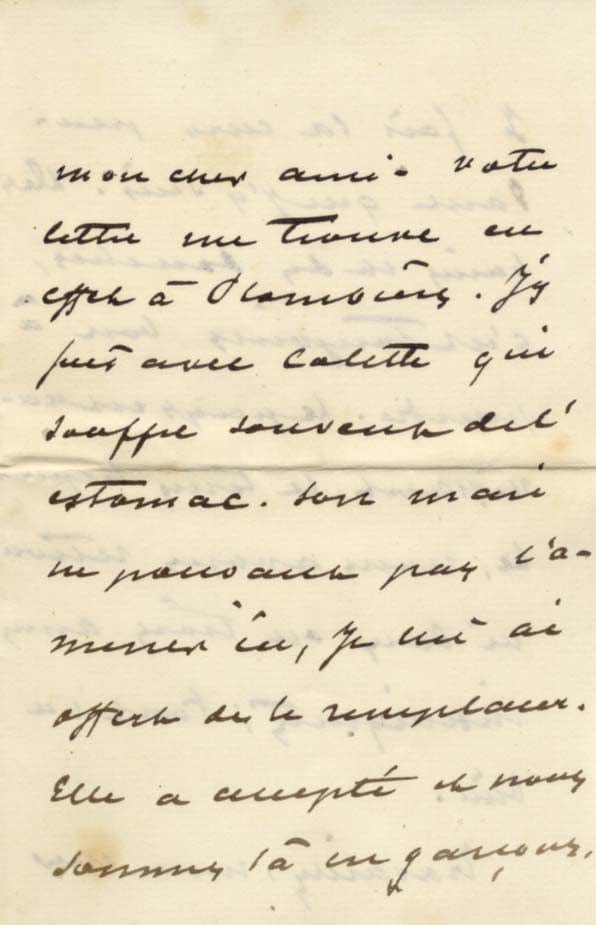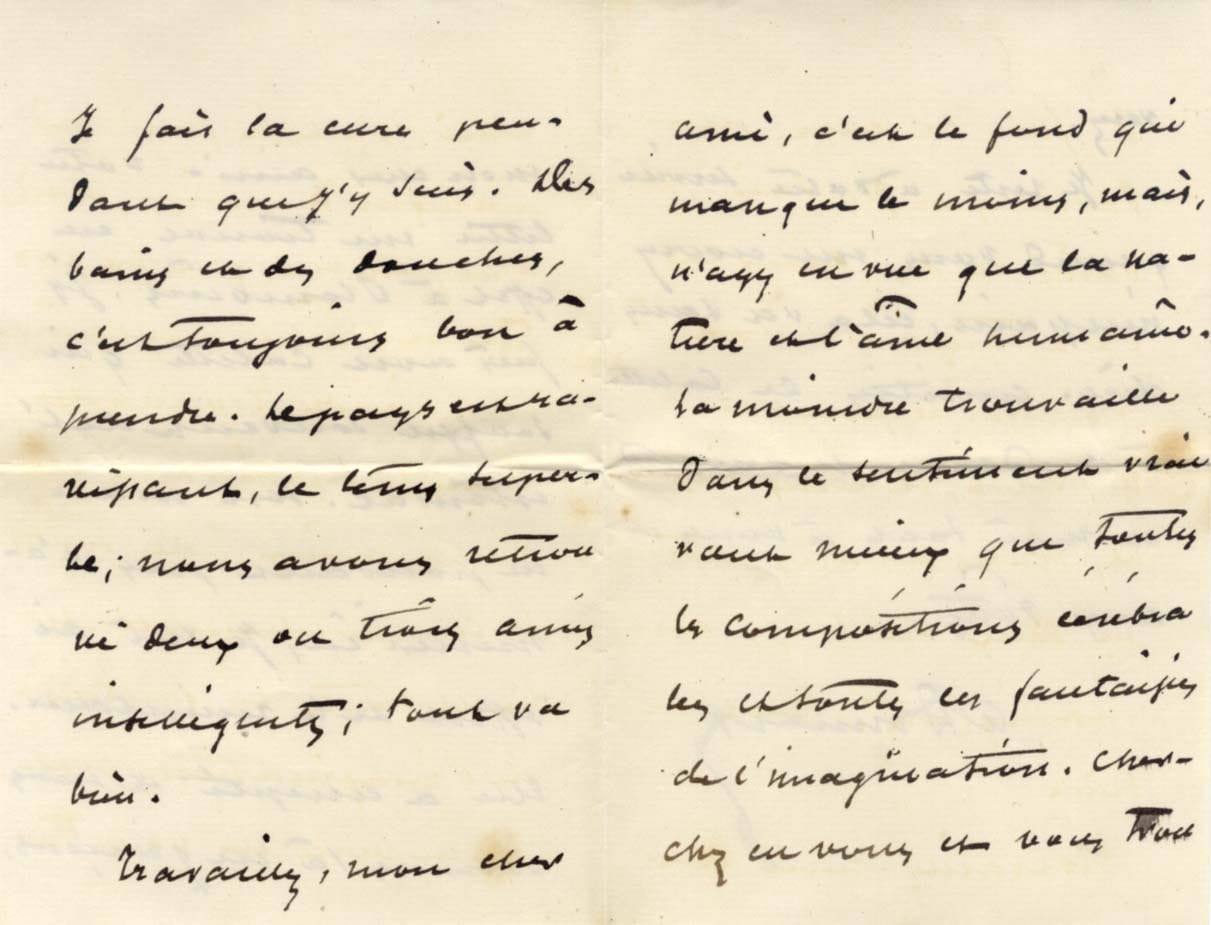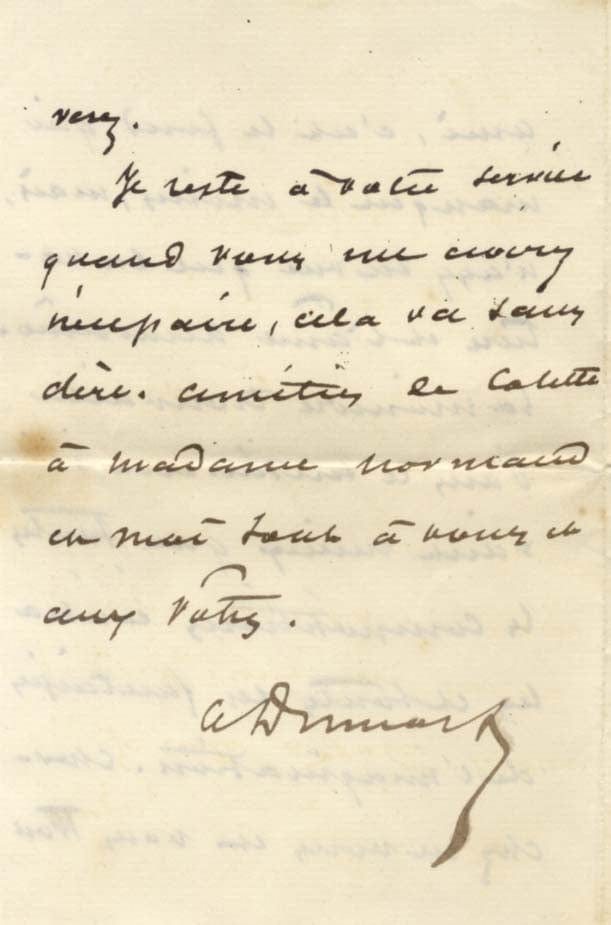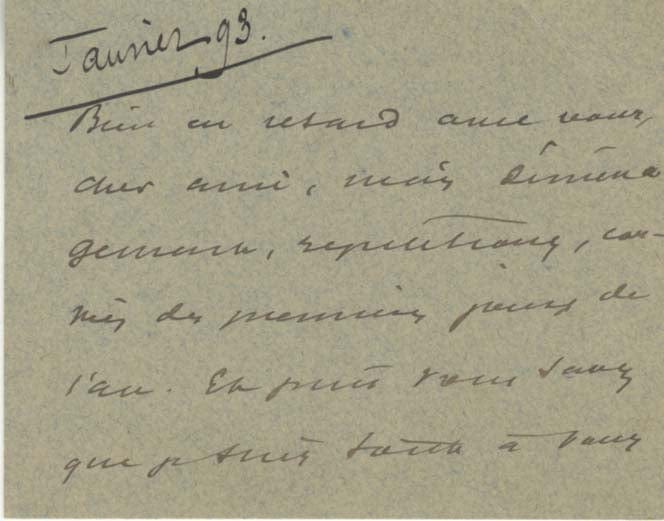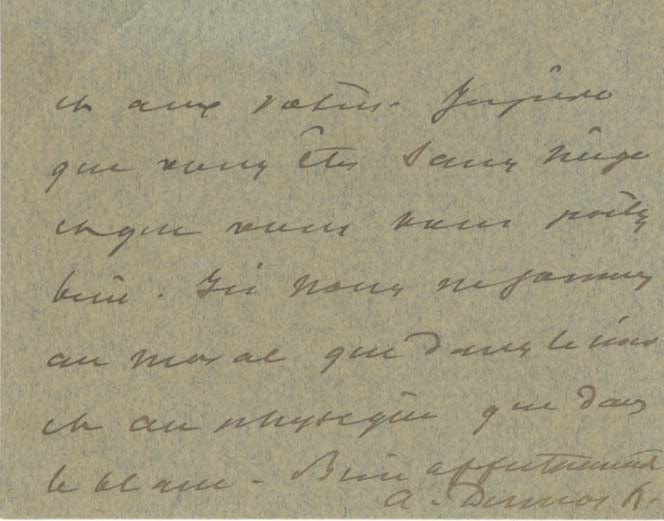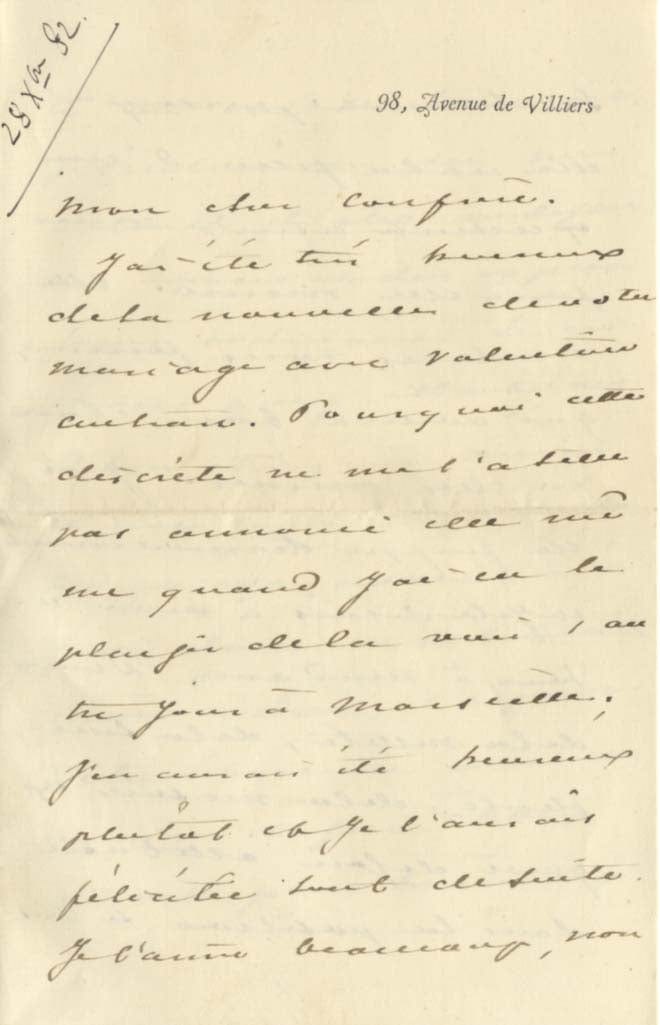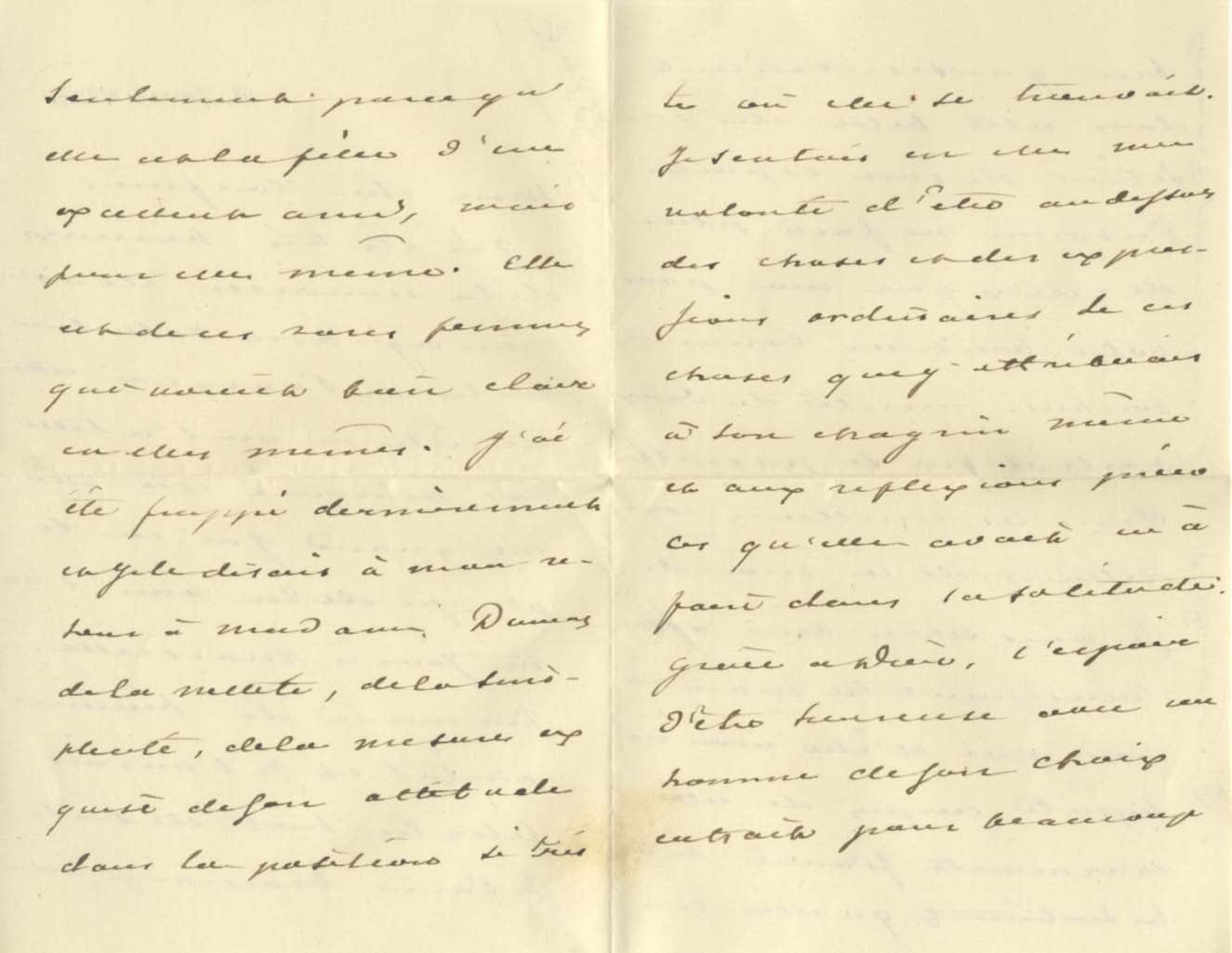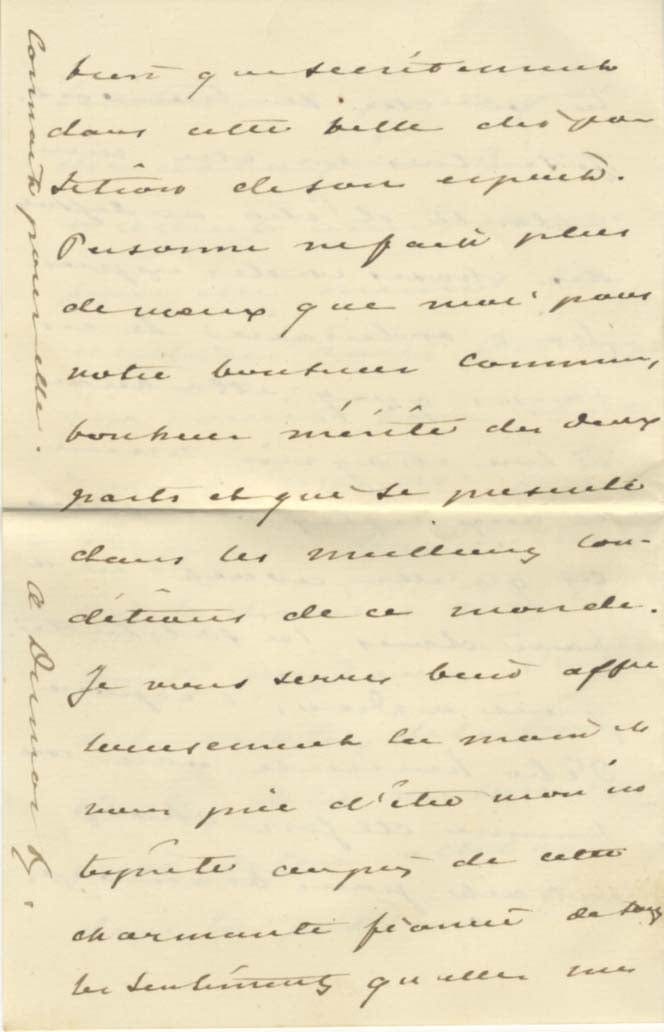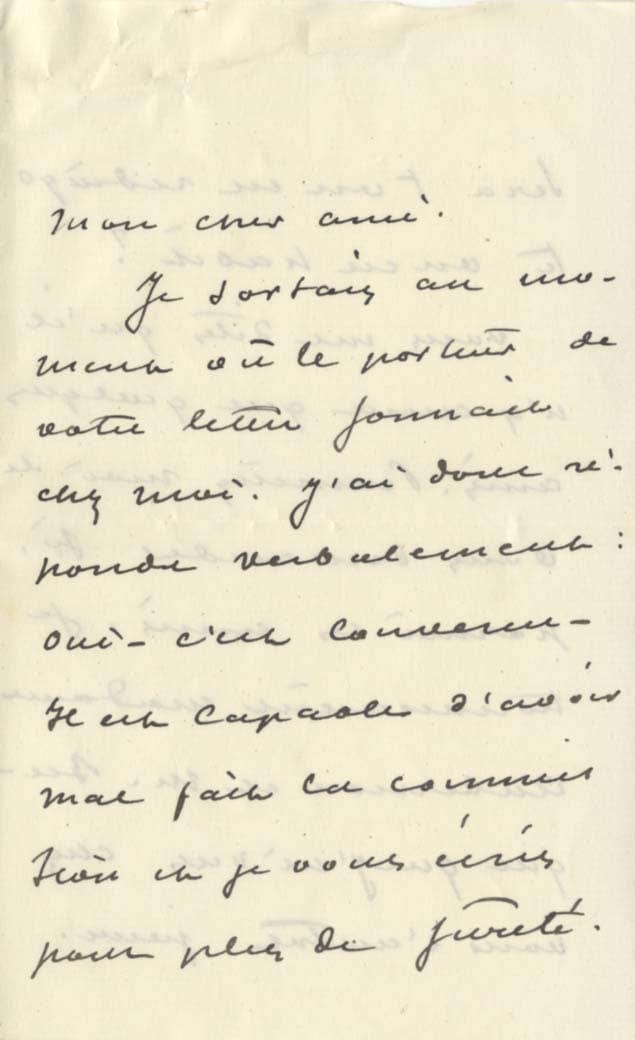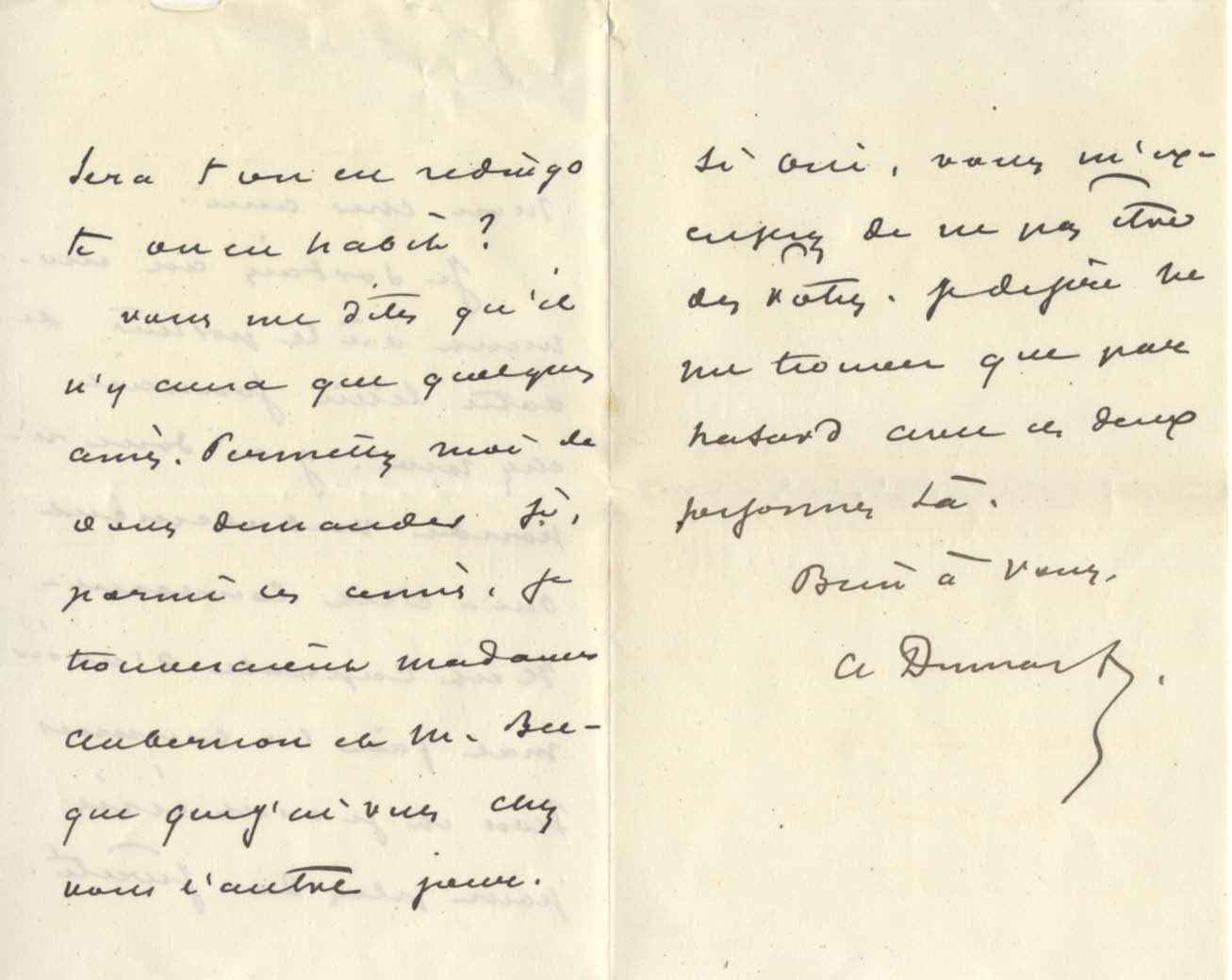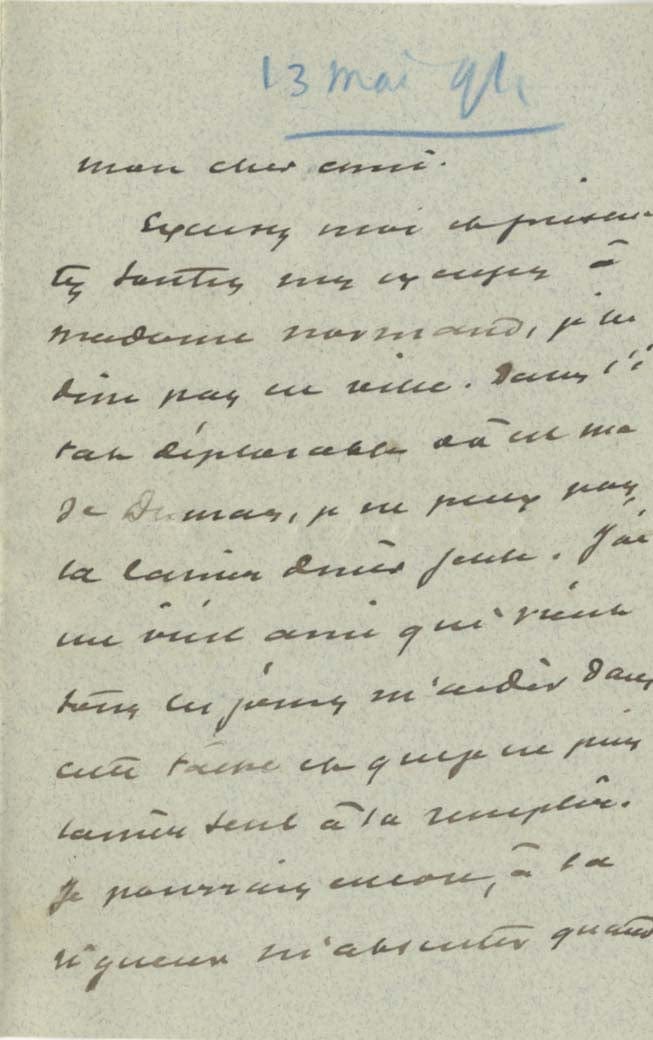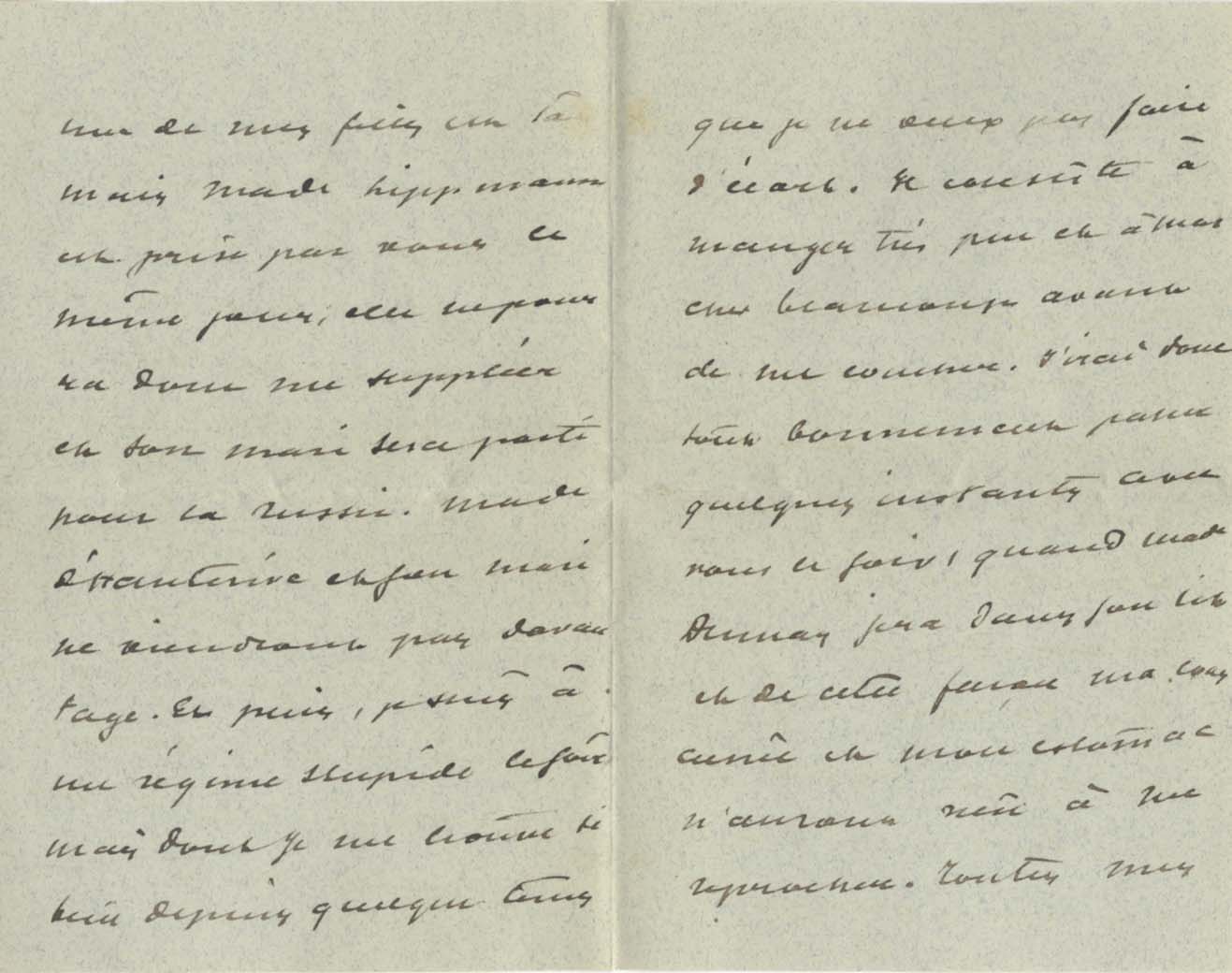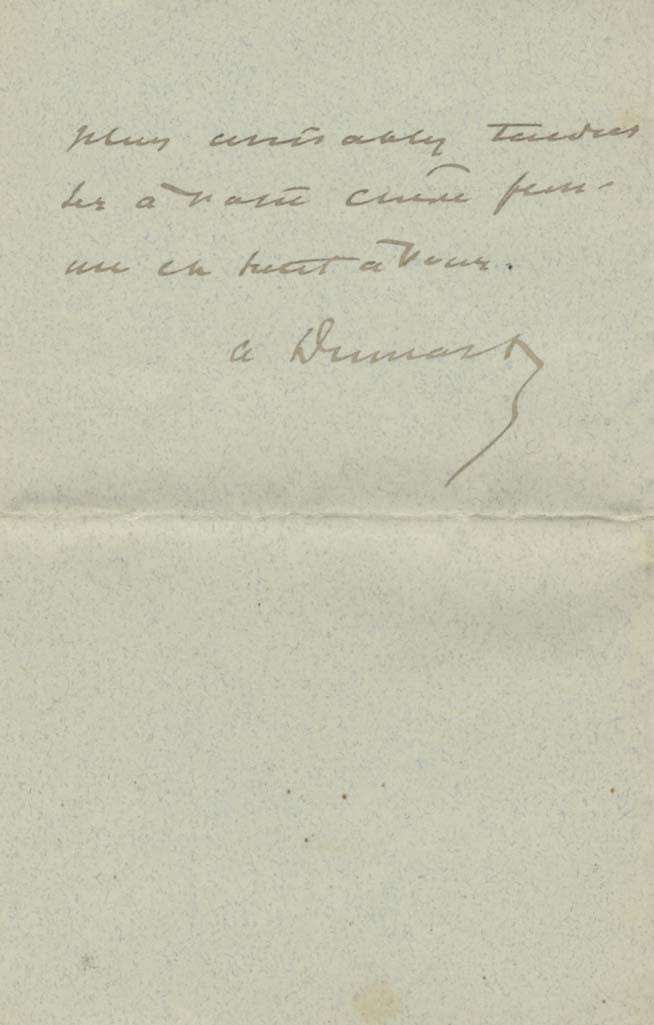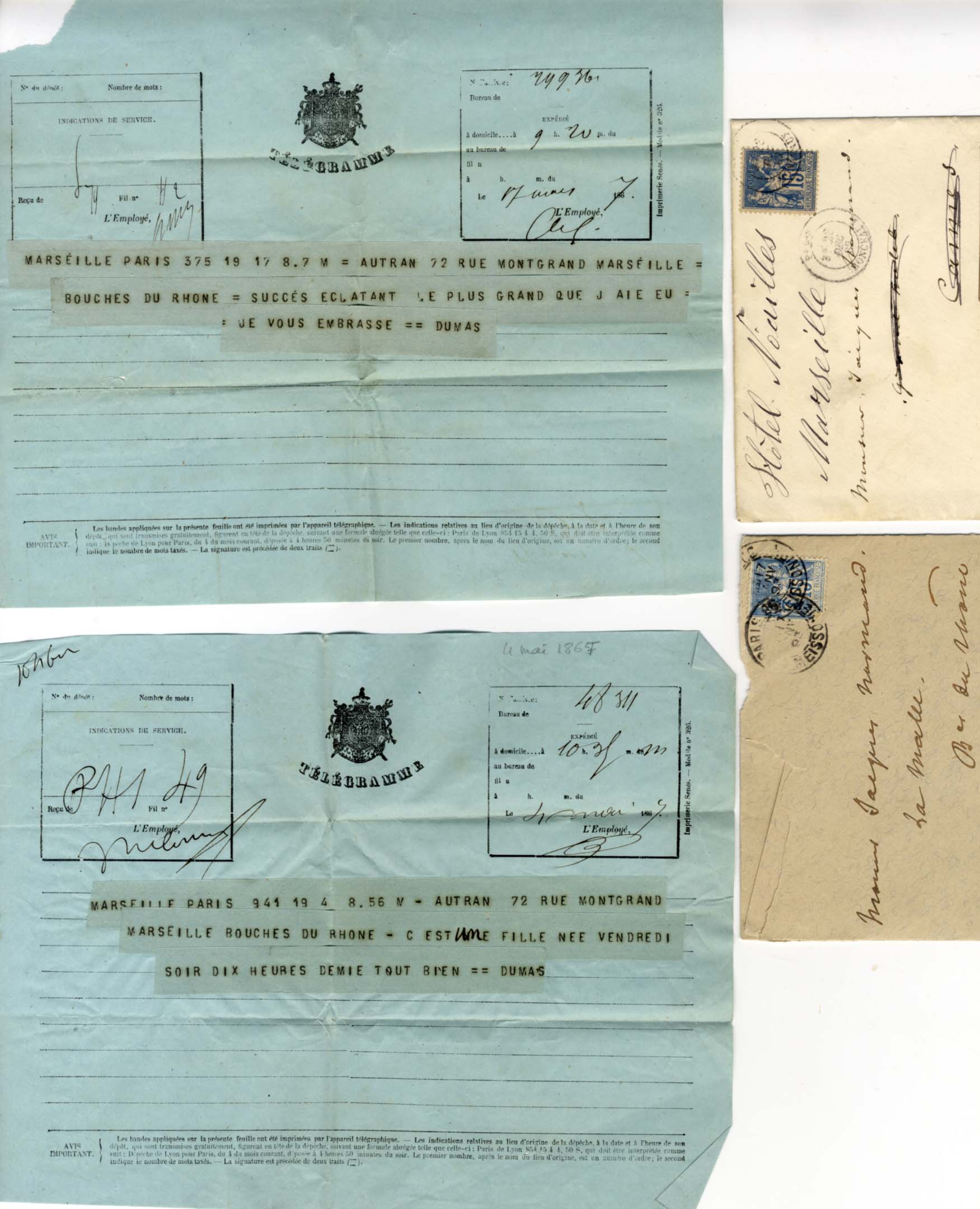وصف
Five autograph letters signed, overall 17 pages (mostly on two conjoined sheets), (4x) about 4,5 x 7 inch & (1x) 4,5 x 3,5 inch (cardboard), (Paris), 1882-1894, in French, all to Jacques Normand (1841-1931, poet, playwright and writer - married with the daughter of Joseph Autran) - inter alia concerning holidays, work, a meeting with Colette, health of Madame Dumas, all written and signed in dark ink "A. Dumas f.", bulk with letter folds, and mild signs of wear - in fine to very fine condition. Accompanied by two original envelopes & two telegrams (printed).
17/19 janvier 1893.
“Bien en retard avec vous, cher ami, mais déménagements, répétitions, causées des premiers jours de l'an. Et puis vous savez que je suis tout à vous / et aux vôtres. J'espère que vous êtes sans neige et que vous vous portez bien. Ici nous ne sommes au moral que dans le noir et au physique que dans le blanc.
Bien affectueusement. - A Dumas fils”
Translated:
“I am late with you, dear friend, but with movings, work repetitions, caused by the early days of che year. But you know that I am all your sincerly to you and yours. I hope that you are snowless and your health is good. Here we are morale in the dark and physic in the White.
Very affectionately. - A Dumas fils”
--------------------------------------------------------------
28 december 1882.
"Mon cher confrère J'ai été très heureux de la nouvelle de votre mariage avec Valentine Autran. Pourquoi cette discrète ne me l'a t-elle pas annoncée elle même quand j'ai eu le plaisir de la voir, l'autre jour à Marseille. J'en aurais été heureux plus tôt et je l'aurais félicitée tout de suite. Je l'aime beaucoup, non / seulement parce que elle est la fille d'un excellent ami, mais pour elle même. Elle est de ces rares femmes qui soient bien claire en elles mêmes. J'ai été frappé dernièrement et je le disais à mon retour à Madame Dumas, de la ------, de la simplicité, de la mesure exquise de son attitude dans les positions si tristes / où elle se trouvait. Je sentais en elle une volonté d'être au dessus des choses et des expressions ordinaires de ces choses qui y ---- à son chagrin même et aux réflexions précises qu'elle avait eu à ------ dans sa solitude. Grâce à Dieu, l'espoir d'être heureuse avec un homme de son choix ------t pour beaucoup / bien que secrètement dans cette belle disposition de son esprit. Personne ne fait plus de voeux que moi pour votre bonheur commun, bonheur mérité des deux parts, et qui se présente dans les meilleures conditions de ce monde. Je vous serre bien affectueusement la main et vous prie d'être mon interprète auprès de cette charmante fiancée de tous les sentiments qu'elle me / connait pour elle. A. Dumas fils.”
Translated:
“I have been very happy with the news of your wedding with Valentine Autran. Why thisdiscreet girl didn't announce it to me herself when I had the pleasure to see her, few days ago in Marseille. I would have been happy earlier and I would have congratulated right now. I like her very much, not / only because she is the daughter of a good friend, but for herself. Sheis one of those rare women which are very clear in themselves. I have been touched recentlya nd I said it when Madame Dumas was back, by her [...] by her simplicity, in her exquisite attitude in such sad positions / where she was. I felt in her a will to be above common things and expressions of life [...] Thanks to God, here is hope to be happy with a man of his choice [...] / [...] Nobody does more greetings than me for your common happiness, a deserved happiness, and which is with the best conditions of this world. I'm shaking your hands affectionately and please be my interpreter to this charming bride of all the feelings she / Knows from me to her. A. Dumas fils.”
-----------------------------------------------------
[Bad heath of his wife, which is old, and will die next year impossible to go out for a dinner with his friends because his 2 daughterw cannot replace him near his wife]
13 mai 1894.
"Excusez moi de présenter toutes mes excuses à Madame Normand, je ne dine pas en ville. Dans l'état déplorable où est Madame Dumas, je ne peux pas la laisser diner seule. J'ai un vieil ami qui vient tous les jours m'aider dans cette tâche et que je ne puis laisser seul à la remplir. Je pourrais encore, à la rigueur, m'absenter quand / une de mes filles est là, mais Madame Lippmann [his daugther Collette Dumas Lippmann] est prise par nous le même jour ; elle ne pourra donc me suppléer et son mari sera parti pour la Russie. Madame D'Hauterive [his second daughter Jeanine Dumas D'Hauterive] et son mari ne viendront pas d'avantage. Et puis, je suis à un régime stupide le soir, mais dont je me trouve si bien depuis quelques temps / que je ne veux pas faire d'écart. Il consiste à manger très pur et à macher beaucoup avant de me coucher. J'irai donc tout bonnement passer quelques instants avec vous le soir, quand Madame Dumas sera dans son lit et de cette façon, ma conscience et mon estomac n'auront rien à me reprocher. Toutes mes / plus aimables tendresses à votre chère femme et tout à vous. - A. Dumas fils.”
Translated:
“Excuse me to present
you apologies to Madame Normand, I will not go out for dinner in town. Due to the very bad health Ms. Dumas, I can not leave her alone for dinner. I have an old friend who comes every day to help me in this task and that I can not leave him alone to do it. I could absent only when / one of my daughters is here, But Mrs Lippmann [his daugther Colette Dumas Lippmann]is not available this same day ; she won't be able to help me and her husband is gone in Russia. Mrs D'Hauterive [his second daughter Jeanine Dumas D'Hauterive] and her husband will not come any more. And then I am on a diet for the moment, which makes me feel better / ´that I do not want to do any gap. It consists of eating very clean and chew a lot before to go to bed. So I will go and see you just for a short moments this the evening, when Madame Dumas will be in bed. So, my consciousness and my stomach will have nothing to reproach me. All my / loving tenderness to your dear wife and sincerly yours. - A. Dumas fils.”
---------------------------------------------------------------------
[Holidays and spa treatment in Plombières Les Bains with his daughter Colette. Advises about works of his friend.]
“Mon cher Ami. Votre lettre me trouve en effet Plombières. J'y suis avec Colette qui souffre souvent de l'estomac. Son mari ne pouvant pas l'accompagner ici, je lui ai offert de le remplacer. Elle a accepté et nous sommes là en garçons / Je fais la cure pendant que j'y suis. Des bains et des couches, c'est toujours bon à prendre. Le pays est ravissant, le temps superbe ; nous avons retrouvé deux ou trois amis intelligents ; tout va bien. Travaillez, mon cher / ami, c'est le fond qui manque le moins, mais n'ayez en vue que la nature et l'âme humaine. La moindre trouvaille dans le sentiment vrai vaut mieux que toutes les compositions cérébrales et toutes les fantaisies de l'imagination. Cherchez en vous et vous trouverez / Je reste à votre service quand vous me croirez nécessaire, cela va sans dire. Amitiés de Colette à Madame Normand et moi tout à vous et aux vôtres. - A. Dumas fils.”
Translated:
“My dear friend. Your letter has jsut arrived to me in Plombières. I am overthere with Colette, who often suffers from her stomach. Her husband couldn't go with her, so, I propose her to replace him. She accepted and here we are like mens / I do the spa as long as I am here. The baths and diapers [spa], it is always good to take for the health. The country is delightful, the time is splendid; We have met two or three smart friends; everything is fine. Work, my dear / friend, it is the background [ of your work ] that lack the least, but just keep in mind only the Nature and the human Soul. The smallest find in true feelings is better than all cerebral compositions and all fantasies of the imagination. Search in you and you will find / I remain at your service when you believe me Necessary. Colette tells frienship to Madame Normand and I tell you sincerly yours. - A. Dumas fils.”
--------------------------------------------------
“Mon cher Ami.
Je sortais au moment où le porteur de votre lettre sonnait chez moi. J'ai donc répondu verbalement : oui, c'est convenu. Il est capable d'avoir mal fait la commission et je vous écris pour plus de sureté . Sera-t-on en redingote ou en habit ? Vous me dites qu'il n'y aura que quelques amis. Permettez moi de vous demander si parmi ces amis, se trouveraient Madame Aubernon et Monsieur Becque que j'ai vus chez vous l'autre jour / Si oui, vous m'excuserez de ne pas être des nôtres. Je désire ne me trouver que par hasard avec ces deux personnes là.
Bien à vous. - A. Dumas fils.”
Translated:
“My dear friend.
I was going out Where the postman of your letter ring the bell. So I have answered : Yes, it's agreed. I want to be sure the answer will go to you so I am writing to you more safety. Will we be in a frock coat or in simple clothing? You tell me that we will be only a few friends. Let me ask if among these friends, there will be Miss Aubernon and Mr Becque I've seen last day in your home. If so, you will excuse me to not be one of ours. I wish find me only by [bad] chance with these two people there.
Yours sincerly. - A. Dumas fils.”
مزيد من المعلومات حول الشخص
Profession:
(1824-1895) Author and dramatist.
Year of Birth: 1802
شهادة الأصالة
تباع جميع القطع لدينا مع شهادة الأصالة. إذا تبين أن قطعة كانت خاطئة أو إذا كنت لا تحب توقيعه ، فستستعيد أموالك لمدى الحياة.
الدفع والأمن
تتم معالجة معلومات الدفع الخاصة بك بشكل آمن. لا نقوم بتخزين تفاصيل بطاقة الائتمان ولا يمكننا الوصول إلى معلومات بطاقة الائتمان الخاصة بك.

